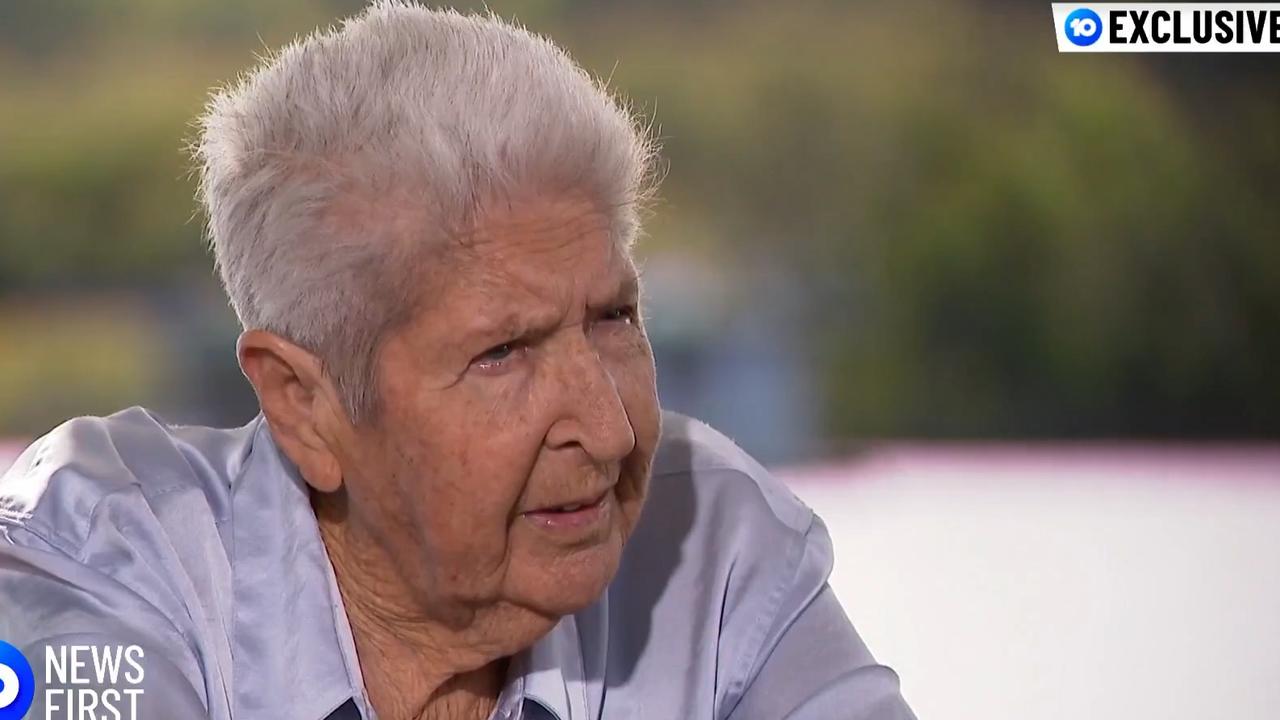Tokyo Olympics 2021: Australian women win gold in the coxless four
Back on the programme after being retired for almost 30 years the Australian women’s coxless four produced something special on a historic day in Tokyo.
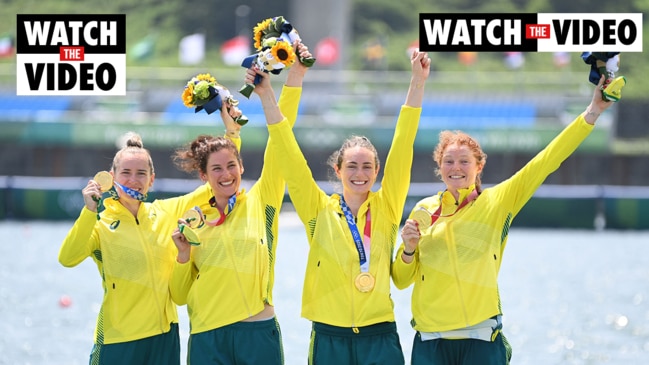
Olympics
Don't miss out on the headlines from Olympics. Followed categories will be added to My News.
AN Olympic record in rowing’s newest event – surely that deserves hugs all around?
In a historic day for world rowing, the Australian women’s coxless four won an Olympic gold to launch its own chapter in women’s sport.
The women’s four event had been retired from the Olympic program for almost 30 years.
But with the International Olympic Committee moving towards gender equity, the women’s coxless four class returned for these Games.
A beaming Lucy Stephan took it upon herself to present her crewmates with Australia’s first rowing gold medals of the Tokyo Olympics.
“I think I just claimed that myself. I wanted to hug all the girls,” she said of her impromptu podium presentation.
Sitting in bow, Stephan – the most experienced member of the crew – had also allowed herself a cheeky peek just before crossing the line.
Four golds were on offer for the Aussies at Sea Forest Waterway and the women’s coxless four struck first on rowing’s Big Wednesday.
■ OLYMPICS LIVE: Follow all the action from Tokyo here
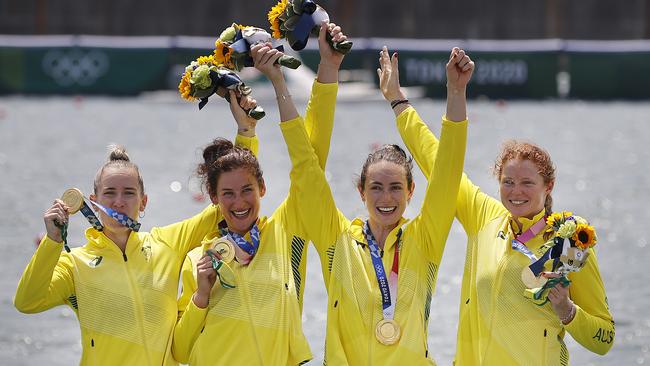
Holding off a fast-finishing Netherlands, Australia crossed the line first in 6min 15.37sec. Ireland was third.
“Bow seat is … my job to call it and look out of the boat,” Stephan said. “I could sense them (Netherlands) coming but I was remembering our race from 2019 when we pulled away and I had trust in this crew that we could do the same.
“I think we had a bit of a dirty stroke maybe 100 to go that disturbed me. But we were straight back on it and I think they had a dirty stroke.
“It was hard, pretty dicey out there, and super-quick conditions. We were only a second outside the world record. (But after their dirty stroke) … that’s when I was like ‘we’ve got this’.”
This was right up there with Cathy Freeman’s magic night in the 400m in Sydney, particularly given the fight for this event to return to the Olympic program.
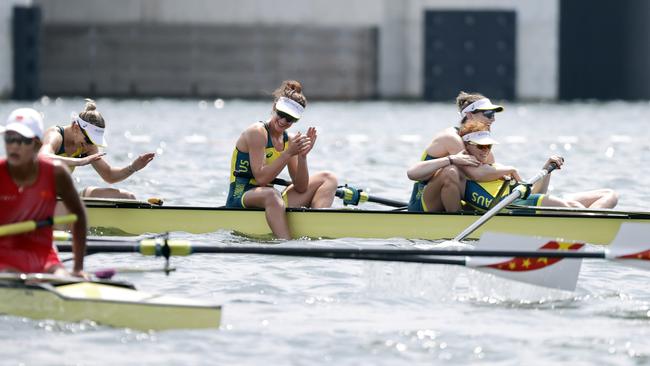
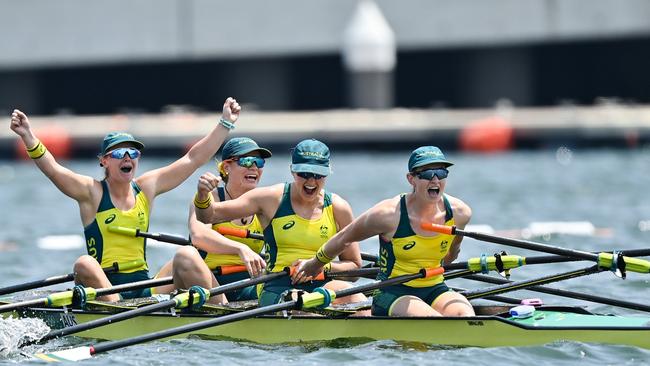
A fight that has been waged since the event made a one-time appearance in 1992.
As the current world champions, Stephan, Rosemary Popa, Annabelle McIntyre and Jessica Morrison desperately wanted this one.
They had set an Olympic record in their heat and looked specials to improve on that in the final.
Early pressure meant Netherlands was just a blink behind the Australians at the 250m mark and at 1000m the Aussies had pulled a full second ahead.
Unlike the eight, the coxless four is exactly that – coxless. But the feeling of unity is essential.
Without a coxswain, McIntyre steers the four from the stroke seat with a rudder cable attached to her right foot.
With Stephan making the calls, Popa and Morrison provide the engine room.
“In the last 50, I think I was trying not to have a cry,” Popa said.
“My oar was very, very wet so I was just thinking about trying to stay clean and long, and breathe, listen to Lucy, and follow Jess and Annabel.
“My role is to be a bit of a workhorse and transfer rhythm.”
The medal for Popa continued her family’s Olympic tradition. Her parents, Sue Chapman-Popa and Ion Popa, were medallists for Australia at Los Angeles in 1984.
“To have waited so long for this ... the equality between men and women of the seats available is so cool and I think it is just a testament to Rowing Australia to have five good women’s boats on the water at the moment,” Popa said.
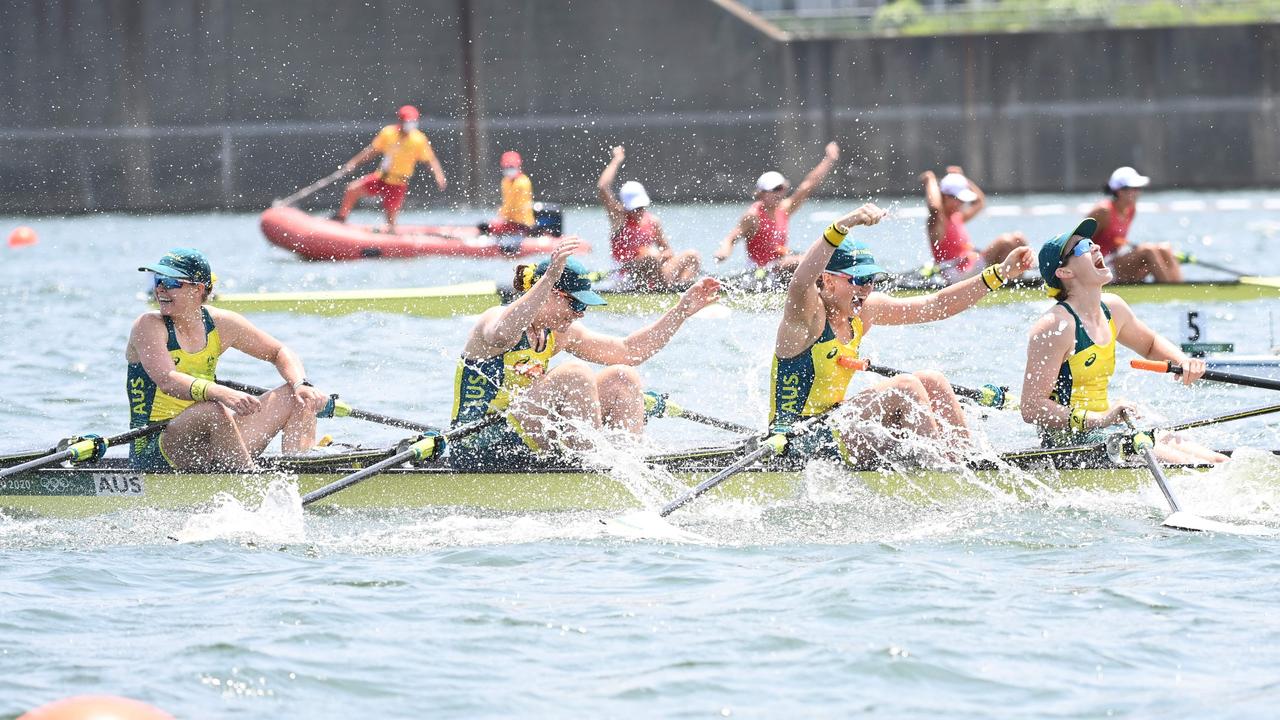
For Morrison and McIntyre the celebration was short-lived because they had to back up for the women’s pair semi-final, in which they finished fourth to miss out on the final.
On the women’s historic gold medal win, Morrison said: “It is such an honour to be part of something that hasn’t been in the program for so long.”
On the semi-final loss: “It’s something we have practised over the past few years – getting ready for another event. I think we got unlucky with the race scheduling.
“The desperation required for the semi-final (was missing); it was heartbreaking for us.”
Men join women in golden morning
The Australian men’s coxless four made it two from two as Australia won back-to-back gold medals as Sea Forest Waterway on Wednesday.
The men have also only lost one race during the current Olympic cycle and the Aussies boast arguably the world’s best rower in Alex Hill in stroke, joined by Alex Purnell, Spencer Turrin and Jack Hargreaves.
By 500m they had clear water and a 13-second lead but by the last 50m a fast finishing Romania almost snatched victory, finishing just 0.37 seconds behind with Italy third.
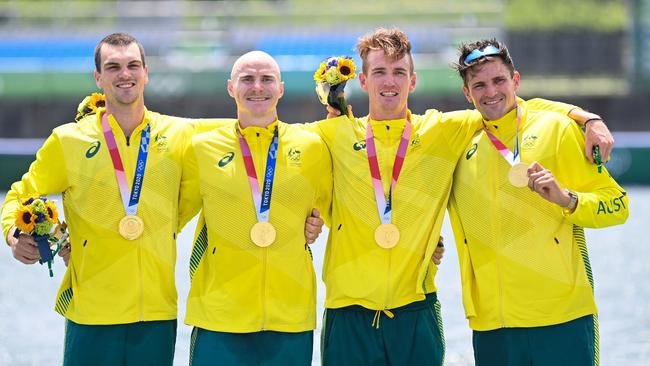
Italy had a late change in their crew with rower Bruno Rosetti testing positive for Covid.
The gold for Australia broke Great Britain’s stranglehold on the event. Great Britain have won gold in the men’s four at every Olympics since 2000.
Straight after the the national anthem for the women’s coxless four medal presentation, Australia’s men’s quad sculls were in action but couldn’t turn their Rio silver into Tokyo gold, finishing with a bronze medal.
At 1000 metres had settled into third and with 250 metres to go they had lifted their stroke rate to 42 – easily the highest of the final.
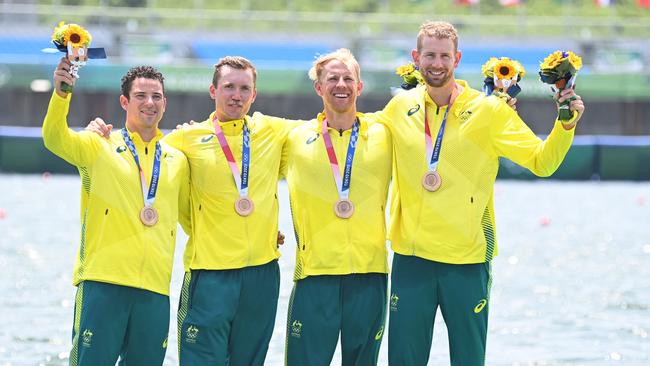
Stroke Luke Letcher took a cheeky peek across to the left but Netherlands held on to win in 5min32.03 secs with Great Britain next and Australia 1.94 seconds behind.
But for Australia’s Jack Cleary, Caleb Antill, Cameron Girdlestone and Letcher it was a race within a race.
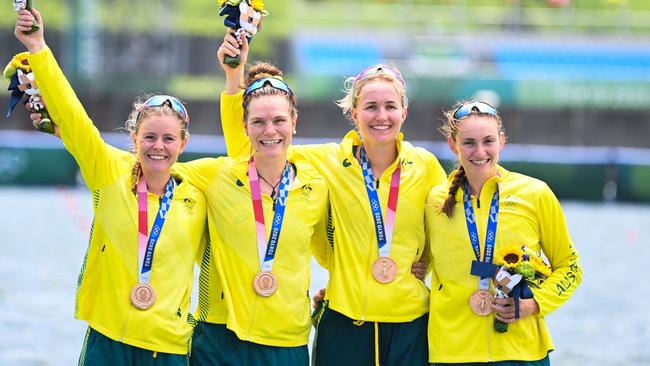
To hold on allowed Australia to finish the first three finals with three medals – bettering their Rio haul.
And that was before the women saluted in the very next event, taking home bronze in the quad sculls.
As all eyes turned to Ariarne Titmus’ gold medal effort in the 200m freestyle, Ria Thompson, Rowena Meredith, Harriet Hudson and Caitlin Cronin survived a chaotic finish to take third behind China and Poland.
Aussie rowers set sights on record, gold in Tokyo
In an hour of power, Australia’s men’s and women’s quad sculls will also race for gold.
Experienced campaigner Cameron Girdlestone had predicted Australia would shock the world at these Games and he gets the chance to better his Rio silver medal in the men’s quad.
Wild weather has caused havoc with the rowing program but tropical storm Nepartak is expected to ease overnight.
In all, Australia qualified nine boats for these Games – one more boat than Rio – and eight are still in contention for medals.
Our men’s and women’s eight will need to fight their way through the repechage but both face a tough ask to challenge for medals.
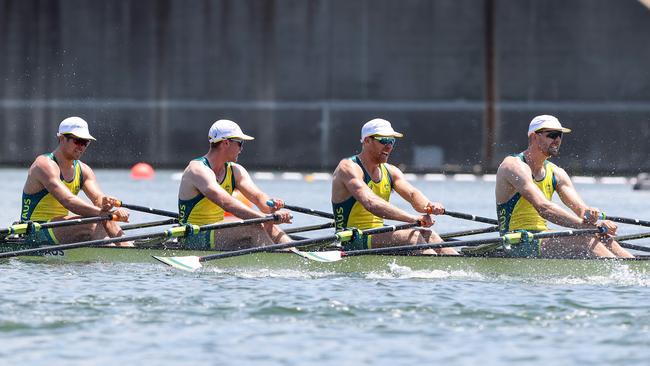
The women’s eight face a particularly tough challenge — if they get through they come up against the dominant US crew, the winner of the last three Olympic golds.
But Aussie head women’s coach John Keogh said the Aussie eight will be better for the enforced weather break, after the eights were brought forward a day.
And as for the four, Keogh said: “We’ve been working on combinations and to have Annabelle and Jess, our women’s pair, joining the crew, I think has worked well for us.”
But what Keogh doesn’t want to highlight is some lightning fast times recorded in training recently.
Times that will result in an anticipated Olympic record in a historic day for world rowing.





